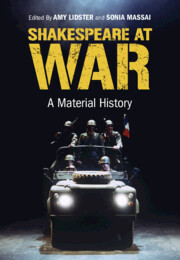‘Amy Lidster and Sonia Massai have assembled an impressive slate of international contributors to explore the wartime deployment of Shakespeare over the span of two and a half centuries of British history. The volume's emphasis on material artifacts-broadsheets, props, newspaper articles, posters and pamphlets, among others-is particularly exciting, as is its examination of the surprisingly complex and variable roles that Shakespeare has played in times of military conflict.'
Garrett Sullivan Jr - The Pennsylvania State University
‘Contributions from Shakespeare scholars, historians, theatre professionals and former members of the military span 400 years of examples, revealing how Shakespeare's plays have been so often deployed in justifying actions in or toward war. The complex realities of Shakespeare at war are animated not simply through textual analysis of familiar plays but equally by a dazzling range of material resources—props, playbills, production photos and posters among them. Shakespeare at war has been, as this collection amply illustrates, a topic for all time, but it is inescapably relevant, even urgent, now and readers will be richly rewarded for their engagement with the breadth of ideas and iterations explored here.'
Susan Bennett - University of Calgary
‘Who better than Shakespeare is there to tell us what men and women face and feel ‘when blood is their argument'? The appropriation of the Bard in violent times and the staggering variety of images, beliefs, rhetoric and parody his plays offer to those afflicted by war are at the heart of this dazzling and delightful book.'
Jay Winter - Yale University
‘I was drawn into this absorbing book, a wide-ranging collection of essays which bear out what the editors say about Shakespeare's plays being ‘embedded' in our culture. The collection admits a marked plurality of voices and histories, reminding us that the past is altered by the present, just as the present is directed by the past. As warfare changes, so do we; and as we change, so too, perhaps, does Shakespeare.'
Hugh Quarshie
‘Recommended.’
S. Magedanz
Source: CHOICE


